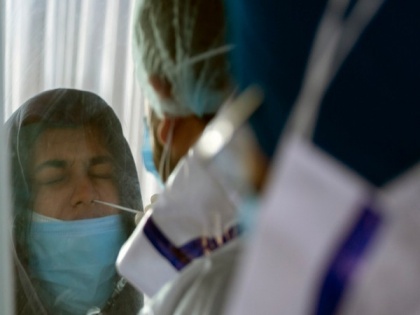Covid-19: Experts stress on strategies to tackle infections in kids with pre-existing co-morbidities
By ANI | Published: May 22, 2021 02:34 PM2021-05-22T14:34:26+5:302021-05-22T14:45:02+5:30
The ongoing second wave of Covid-19, in which number of children affected have seen a rise, has alerted the country's health experts to stress on ways to handle children, with pre-existing co-morbidities, who have been infected with the deadly virus.

Covid-19: Experts stress on strategies to tackle infections in kids with pre-existing co-morbidities
The ongoing second wave of Covid-19, in which number of children affected have seen a rise, has alerted the country's health experts to stress on ways to handle children, with pre-existing co-morbidities, who have been infected with the deadly virus.
In India, 26 per cent of the population is less than 14 years of age and nearly seven per cent are less than five-years-old.
Prof Sheffali Gulati, a Child neurologist at All Indian Institute of Medical Sciences (AIIMS) Delhi told ANI, "What we are stressing at is how to handle the risk of children with pre-existing co-morbidities. Their risk stratification should be done because just like adults children are also not devoid of co-morbid conditions. There are children who are having a neurological problem or under long term medication for which they are given steroids. So we have to think in a different way for them."
"At this stage vaccination will be very crucial for children before the schools open. Moreover, we have to think about post-COVID outcomes because here we have to address long-term neurological outcomes too," Dr Gulati added.
It had been observed by the health experts that following the pandemic there has been a setback in the overall vaccination immunization program that children should receive because parents/ guardians are not bringing their children to centres due to the pandemic.
Moreover, doctors have also raised concern over children with special needs such as autism and cerebral palsy not receiving regular therapies which they used to get before the pandemic.
Earlier, the National Commission for Protection of Child Rights (NCPCR) wrote to the Union health ministry and ICMR alerting that a third Covid-19 wave may affect children in large number as suggested by health experts.
The letter by NCPRC read, "There is an urgent need to reorganize a Neonatal/children Emergency Transport Service (NETS) to prepare specifically for neonatal [cases] and children for the third wave of COVID-19."
On May 13, the Drugs Controller General of India (DCGI) gave permission for conducting a clinical trial on children for the vaccine being developed by the Bharat Biotech and the Indian Council of Medical Research which is to be used in Phase 2 and Phase 3 trials on children with an age capping of 2 to 18 years.
Dr Sisir Paul, clinical director and head of Pediatrics at Madhukar Rainbow Children's Hospital says, "Vaccination is the most important thing to prevent the disease because as the country opens up it will be a big problem as children would be going out to school and other public places for which children need to be immunized. The nod has come for a clinical trial for 2 to 18 years of age but we are also bothered about children under 2years because we start normal flu vaccine in children at 6 months of age but this condition is much more grave."
As per experts, during the first wave of COVID-19, the children were tested positive but most of them were asymptomatic and did not show any sign of illness and rarely required hospitalisation.
However, in the second wave, children as young as six months to one year old fell sick and need hospitalisation. Most of them had a high fever, poor intake of food, cough and cold and lethargy which was not seen during the last wave.
Health experts have also warned of a third wave that may impact children adversely.
( With inputs from ANI )
Disclaimer: This post has been auto-published from an agency feed without any modifications to the text and has not been reviewed by an editor
Open in app